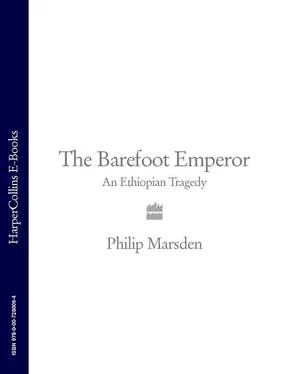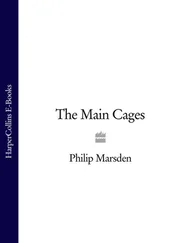I pray, ask her before she goes
If Itege Tewabach was wife and servant
She of such wisdom, such industry, died yesterday
She served me and treated me by ploughing the earth.
Many miles away, deep in Oromo country, was another mourner. Banished to his native province of Yejju, Ras Ali wrote a bitter verse for the double loss of his daughter. He had not seen her since Tewodros had robbed him of his power and driven him into exile:
When I said to her ‘I love mead!’ she brought me honey.
When I said to her ‘I am hungry!’ she brought me my chosen fruits.
When I said to her ‘I am cold!’ she sent me shammas .
Taken by my thief, she is now carried on a coffin;
I grieve not, as long ago she disowned me.
Some weeks before her burial a comet appeared in the heavens. Each night Tewodros went out and sat in the stillness of the mountain to watch the arc streak across the sky. On the fortieth night it was gone. He marched his forces to the Oromo region of Wollo and massacred many people. He captured thousands of animals, and meat became cheaper than cabbage. He appointed a new governor, a loyal man, and went south and killed all those Oromo he could find between Gimbia and Geneta. The children he distributed among his nobles.
In Shoa, someone whispered of the governor’s secret dealings with a rebel. Tewodros had the governor chained and another appointed. That one revealed his treachery before Tewodros left Shoa. He had him chained too. Then he heard that the new governor of Wollo had rebelled. He rode north again, tens of thousands behind him. He rode in silence.
13
Walter Plowden now cut a sorry figure. He had few supporters left in the highlands. He had nothing to offer Tewodros. London had lost interest in his mission. He was desperate to reach the coast, to return to Britain, but the road was still blocked by Niguse. Plowden never doubted that Tewodros would move against Niguse, take Massawa from the Turks and gain access to the sea. But in four years he had been oddly slow to do so.
He was with the emperor on another campaign in Oromo country. ‘Leave the Oromo,’ he urged. ‘Move on Niguse in the north.’
Tewodros resented the interference, but reassured the consul: ‘Nothing but my death shall prevent me from placing you at Massawa.’
It was the last time the two men ever saw each other. They had met in 1855 in a flurry of mutual hope – the newly-crowned Tewodros with his attendant military angel; Plowden and his epistolary link to the powerhouse of the British Foreign Office. Tewodros’s reforms had been stalled by his hydra-headed enemies. Plowden’s paper link had proved just that. In recent years they had grown apart.
In the 1840s, when Plowden had first stumbled into the Ethiopian highlands, the world was a bigger place. British interests were less compromised. Palmerston in 1847 had been able to share Plowden’s enthusiasm for an entire new territory, an ancient half-forgotten kingdom. Trade and thwarting the French added a little pragmatic purpose to Plowden’s carefree project.
By the time of Tewodros’s coronation in 1855, the Foreign Secretary Lord Clarendon remained thrilled by Plowden’s assessment of the emergence of Tewodros and the prospect of opening up relations: ‘Have read his very able report with great interest, and entirely approve his language and proceedings.’
But in the following years it had been impossible for Plowden even to leave the country. In the meantime the convergence of interests in the Red Sea – French, British, Egyptian and Ottoman – had made foreign policy a much more delicate exercise. Involvement in overseas territories was also seen as having a much greater price: the Indian Mutiny had revealed the strange truth that native peoples did not always appreciate the presence of the British. Ethiopia and Tewodros were an equation that didn’t work out; they were risk without profit.
To the Foreign Office, Consul Plowden slipped from view. There was no more talk of receiving an ambassador. By 1860 Lord Russell, Clarendon’s successor as Foreign Secretary, was fed up with this emperor and his endless struggles; all that mattered was the coast. Plowden was wasting his time in the highlands: ‘You will therefore return to Massawa, which is your proper residence, and you will not leave it, unless under very exceptional circumstances.’
But he could not even reach Massawa.
The only duty the Foreign Office now asked of Plowden was to tell Tewodros to stop his persecution of a group of Ethiopian Catholics. Very reluctantly, Plowden sent their letter on to Tewodros: ‘We would advise you earnestly to be like ourselves, that all people shall have religious liberty in your country.’
Not for the first time, Tewodros was baffled by the Europeans. What was his old friend Plowden doing, speaking up for his enemies? The French were supporting Niguse in the north, and Niguse had promised to convert to Rome when he had defeated Tewodros. Yet through Plowden, Tewodros was being asked to accept the Catholics. Was Plowden in league with the French?
Tewodros read the letter on campaign. He handed it to an aide. Six hours later he gave the order to break camp. He never replied.
Seventeen years had passed since Plowden first arrived in the country. ‘The love of change and of the wildest freedom first led me to Abyssinia and made me feel as imprisonment the least restraint.’ Now in Gondar, in and out of fever, lying on another alga in another season of highland rains, he recalled those early days – the excitement of Biru’s camp with just a thaler to his name, the week of ‘song and merrymaking’ after killing an elephant, then rushing to war; hunting hippo on the shores of Lake Tana, or the sunset scene, ‘so strange and novel’, of watching thousands of Oromo swimming the Blue Nile in its mile-deep gorge.
There was the time spent in a mini-fortress with the eighteen-stone Oromo chief Ahmed Huru – ‘the rain prevented us from going out, so we drank tej without ceasing’, and without eating, for six days, while Ahmed ‘eyed me askance in a most ludicrous way’. (He also made an offer to Plowden of his daughter ‘to be my lawful wife, and of a fat portion of his dominions’.)
Plowden had always had luck – leaving his residence in Monculu just hours before the arrival of an army that burned the village to the ground. He had won over the right people – Biru and Wube and Abune Selama and the dangerous Haile the Devil – ‘with my usual good fortune in Abyssinia, I made him my friend’. His friendship with Tewodros was, in its best moments, of great significance to them both. Once on parting for the battlefield the emperor had taken Plowden by the hand and said: ‘All men are mortal; if anything happens to me, befriend my son. Write to your country; say you had a friend who loved you all, and who intended to send an embassy to you for your friendship, and beg them to support my son.’ When Plowden agreed, Tewodros told him: ‘I love and trust you – goodbye!’
Plowden heard the echoes of English history in the country’s arcane customs and codes and its battle lore. He saw Ethiopia on the road of progress, behind Europe, but on the same road, in its own Middle Ages. He admired too the defiant strangeness, the beauty of the landscape, the sights that the people in it would suddenly produce, like gugs – ‘a fine animated game’ of feigned battle: ‘with their scarlet saddle-cloths and glittering benaicka flashing in the sun, and long sheepskins on their shoulders, the hair streaming as they gallop, they present a picturesque and wild appearance’.
From the time that he became consul and signed the treaty, something of Plowden’s initial joy was lost. Even the excitement of Tewodros’s early reign soured. Five years he had been stuck in the highlands. Now his luck seeped from him. In November 1859, playing a game of gugs himself, his horse rolled and he broke his leg. For two months he was ‘entirely incapacitated’. When he wrote again to Lord Russell, and apologised, it was to tell him that he had heard that the French had sent an embassy to Massawa – further backing for Niguse. For some time the rivalry between Niguse and Tewodros had reflected the growing rivalry for the Red Sea between Britain and France. Niguse had the advantage, having blocked Tewodros from the coast. Tewodros now appeared the loser.
Читать дальше












